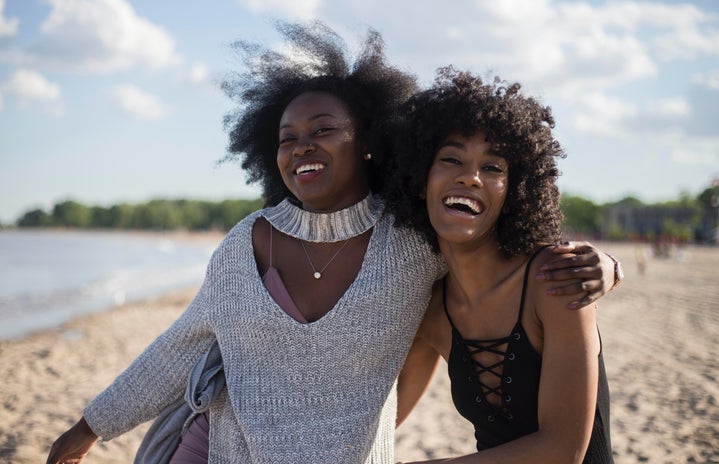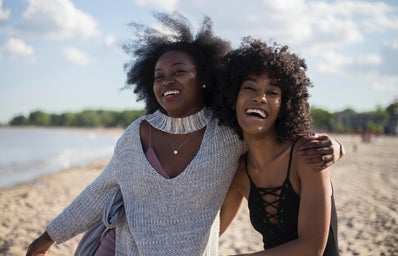Despite new developments and increased awareness in the field of mental health, discrimination and lack of acknowledgement still throws a spoke in the wheel of talks about Black women in this regard. Her Campus, in collaboration with Kate Spade New York and Black Girls Smile, took a step in the right direction by hosting a conversation about mental health. Focusing exclusively on Black women, this turned the page for a community that has waited to feel supported and empowered through their journey. At Let’s Talk: Black Women Exploring Journeys in Mental Health, Black women discussed mental health issues specific to them and shared unfiltered perspectives, stories, and advice aimed at helping women who look like and experience the world like every other Black woman.
Here are some of the standout moments of this event that helped make new progress in establishing a sense of togetherness in this community:
In a conversation with Alexis Barber, content creator and host of the “You’re Too Smart for This” podcast, actress Logan Browning shared her journey with navigating mental health as a Black woman. Having started working in the industry as a 14-year-old, Logan Browning was a starry-eyed teenager who didn’t know anything about the world she was getting into. Being away from her parents and her comfort zone, she had to, like many other young Black women, seek out tools to help maintain her mental health on her own. She talked about how turning to helpful resources has happened after major breakdowns, and shared that what helped her was accepting that there are going to be “crazy moments” in life.
Answering a question about how her identity as a Black woman contributes to the pressure to be perfect, Browning explained that because of their history as a community in America, Black women begin to feel from a young age that they need to fight just to level the playing field. I can only imagine how a disadvantaged feeling at such a young age would make someone feel, which displays that talks like these are really important to have.
In another three-way conversation with activist and clinical psychologist Dr. Vivid, speakers Shadaè Lezama and Nylah Boon discussed the burnout aspect of mental health in Black women. Mentioned again was the inherent disadvantage in being a Black woman, which translates into feeling pressured and overburdened to work twice as hard to get to where others are. This goes to show how common these disadvantages are to all Black women, and how this community stands together in the fight for equality.
Logan Browning also brought up one of her management strategies, which she documents and shares with the world through social media. She explained how she started meditating because of a role in which she did yoga. From there, she fell into the realms of meditation, and learned how magical it was to experience her life force.
She advised young Black women to understand themselves deeply, so they don’t get wrapped up in the definitions the world attaches to them. She talked about how it’s important to find the right balance between having pride in their identity as Black women, and knowing themselves outside of that one aspect.
Having graduated from college recently, both Shadae and Nylah agreed that the pressure of finding work and comparing themselves to other students, along with their personal struggles with mental health, has made them feel like they needed to stop running and catch their breaths. Dr. Vivid stated in response to this that this notion of being a superwoman and the glorification of “doing it all” is damaging, and has negative impacts on mental health. She expressed the importance of taking time for themselves and explained how symptoms of depression and anxiety would flare if they don’t “pour into themselves.”
The speakers also talked about their own ways of “pouring into themselves” and managing mental health, instead of waiting to burnout and then taking a step back. Among their strategies were bubble baths, watching movies, listening to music, and hitting the outdoors, along with the tools that Logan mentioned previously, such as meditation and journaling.
Touching on the importance of having community and sisterhood for mental health support, clinical social worker and founder and CEO of Mental Wellness Collective Shevon Jones and content creator Zion Ross talked about the importance of not feeling alone in their struggling journeys by building a community. They explained how by being Black women, there are certain commonalities in the way they experience life, and if they have a community of people who go through life in a similar way, it can help them in not feeling alone and being vulnerable about mental health issues.
Since a talk about mental health wouldn’t be complete without referencing mental health services and support, Lauren Carson, the executive director of Black Girls Smile, and content creator Mykal-Michele Longino talked about access to mental health services that provide healthcare tailored to the unique experiences of Black women. Lauren Carson suggested that online therapy, which is now widely available, could be utilized — especially in areas where it’s hard to find health care providers who understand Black women’s issues. Importantly, she also expressed the need for mental health services as not just a treatment but also as a prevention. She then suggested resources to teach about mental health problems and several other programs where it’s easy to find therapy providers that are especially beneficial to Black women.
The event’s discussion showed how there are common themes to the way Black women experience their journeys and navigate their careers and personal lives — and that these discussions aren’t common. It’s because of these reasons that safe spaces like Let’s Talk become absolutely essential for the development of the Black female community in society.


